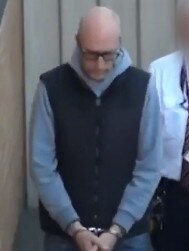SA pedophile Geoffrey William Moyle a 'child sex terrorist' whose sentence must be increased, court hears
The infamous SA pedophile known as Waka is a "child sex terrorist" whose jail sentence must, a court has heard, be increased – or else other perverts will receive leniency.
Police & Courts
Don't miss out on the headlines from Police & Courts. Followed categories will be added to My News.
The SA man who helped start the global online child exploitation market is a "child sex terrorist" whose "inadequate" sentence will undermine punishments across the country, a court has heard.

They want the Court of Appeal to replace his nine-year sentence, which leaves him eligible for parole in 2024, with one of the harshest penalties ever imposed in Australia.
The bid is expected to face staunch opposition in court as it goes against existing national legal precedent.
Courts around the country have, over the previous decade, repeatedly ruled a 10-year head sentence is appropriate for the abuse of children overseas.
A foreign aid worker, Moyle, 47, of Westbourne Park, filmed himself abusing child sex slaves in overseas brothels.
He was among the first criminals to share such material online – under his alias “Waka” – with other perverts, who called him the man who “wrote the Bible on child abuse”.
“Waka” was the target of a 20-year international manhunt that ended in 2019, when Moyle was unmasked and arrested by SA’s Joint Anti Child Exploitation Team.
Detectives matched a watch, a pair of shoes and a growth on “Waka’s” thigh to Moyle’s possessions and physical characteristics.


After paying one of his victims $84,000 compensation, Moyle was jailed for more than nine years, with a 4 ½-year non-parole period backdated to his arrest.
In sentencing, District Court Judge Paul Cuthberston said prosecutors had called for Waka to be jailed for 14 years, but noted such sentences had been overturned on appeal interstate.
“It seems to me that there is a good argument that the penalties as set down in the respective courts of appeal may be too low,” he said.
”As a judge of the District Court, I don’t think it is appropriate for me to change a sentencing regime that has been imposed by three different courts of appeal throughout Australia.”



